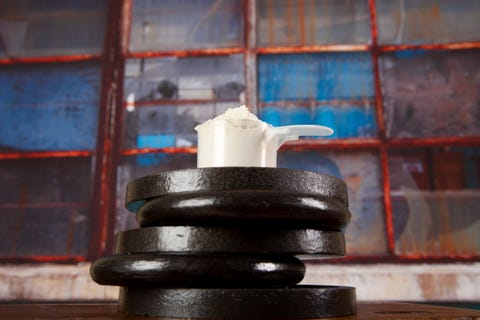How to Decode Protein Powder Labels
The right jug has nutrients to build muscle. The wrong one has a lot of BS. Let us decode the label to help you make the best choice.
Follow these tips next time you pick up a tub of protein so you’ll be at your muscle-building best. These options are also a great place to start.
Spot-Check the Protein Source
Your best bet is to go with whey-protein isolate. “It’s typically less expensive, it’s a complete protein, and it’s more easily absorbed,” says Jim White, R.D.N., owner of Jim White Fitness and Nutrition Studios. By comparison, casein-based powder is digested more slowly, making it slightly less effective for muscle synthesis. And collagen protein? Well, not many studies prove its effectiveness.
Target the BCAA Ratio
It’s short for “branched-chain amino acids,” three protein building blocks essential for maintenance and growth. Most labels list BCAAs as a ratio of leucine, isoleucine, and valine, in that order. Look for two parts leucine to one part isoleucine to one part valine. This ratio is ideal for muscle building, fat loss, and fatigue, says White. If these amino acids are not listed, go with another powder.
Cap Those Carbs
Find a protein powder that has up to 3 percent of your daily value of carbs per serving. Carbs increase insulin, which promotes amino-acid absorption, stimulating muscle growth, says NancyRodriguez, Ph.D., R.D.N., a nutritional-sciences professor at the University ofConnecticut, Storrs. Plain protein powder with eight ounces of low-fat milk will give you the post workout carbs you need.
Go Easy on the Sweets
Companies often use artificial sugars or natural zero-calorie ones like stevia in order to keep calories and carbs low. That’s a noble pursuit, but here’s the thing: Animal studies report that artificial sweeteners may harm beneficial gut bacteria. While stevia doesn’t seem to cause problems, it tastes weird, so it’s often mixed with xylitol and sorbitol, sugar alcohols that may cause gas and bloating. Go unsweetened.

jorgegonzalezGetty Images
Skip Probiotics
These helpful bacteria may be good for you, but “the amount and type of probiotics needed to provide beneficial outcomes depends on the person and their current gut microbiota,” White says. Better to talk to a registered dietitian, who can recommend probiotic foods
or a supplement.
Trust the Third-Party Seal
The NSF International (National Sanitation Foundation) “Certified for Sport” seal means a product contains what the label says it does, has been tested for contaminants and substances banned by major athletic organizations, and is made at a facility audited annually for quality and safety. Not many powders have the seal; it’s worth it to find one that does.
The Bottom Line
Choose a protein powder that’s ideally unsweetened with as few ingredients as possible, protein as the first listed ingredient, and the NSF seal. If you can tolerate dairy, opt for whey-protein isolate. A ratio of about 150 calories per 25 grams of protein is good for muscle building and fat loss.
Source: Read Full Article


